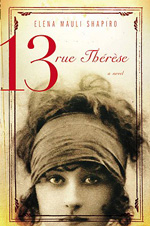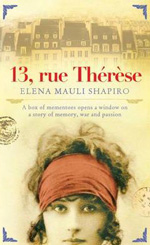
It is not often, when I am reading, that I am so overcome by emotion that I must put the book down until later, when I am quite myself again. I was not expecting that to happen when I began to read 13, rue Thérèse; after all, I've read many love stories and many war stories. I've encountered other tales of love and loss, passion and pain, fulfillment and yearning. So I wasn't prepared when this engaging and inventive novel left me first stunned and speechless, and then rushing to find pen and paper so I could record the experience.
The central plot is straightforward: in 1920s Paris, Louise Brunet, a young woman who had lost loved ones during the First World War, becomes attracted to a handsome new neighbor. Although she loves her husband, she yearns for romance and excitement. But Louise is no Emma Bovary: she is an intelligent and spirited young woman who has been cheated of the love of her life and the child she has always wanted. In the vacuum thus created, she is drawn into a passionate romance almost beyond her control.
Louise's story is told within a frame in which an American academic, Trevor Stratton, is working in Paris. Trevor becomes obsessed with an old box of artifacts that he finds in his office. The box includes letters, lace gloves and worn coins, a clever pencil holder made from German bullet casings, a silk souvenir scarf of the Great War, and other mementoes. Through letters that he writes to an anonymous "Sir" back at home, Trevor explores this record of a long-ago life, and ponders what each item must have meant to Louise.
The narrative is intriguing; it becomes difficult to discern when events taking place in Louise's life are being told to us by an omniscient narrator, or when Trevor is simply imagining what may have happened. Letters that Trevor writes to "Sir" relating his findings segue seamlessly into events described so vividly it is as if you are witnessing them firsthand. On one page, for example, you may be reading a letter Trevor is translating, only to realize on the next page that somehow you are on the battlefield with Louise's lost love, Camille. Are these events only scenes in the story that Trevor is constructing? Blurring the line between imagination and reality even further, some of the letters in the novel appear to have been written in response to letters found in the box, yet it is unclear whether Trevor has composed these himself as he speculates on what may have occurred, or whether the author is providing the text of letters that actually existed but are now lost.
Eventually Trevor discovers that his quiet secretary Josianne has beckoned him into the world of Louise by giving him the box of artifacts. Why? Is she trying to reveal something to him, or is she only trying to infuse her interest in Trevor with the romance gleaned from Louise's life? And what was it, you might ask, that made me set the book aside until I had recovered from the emotional impact it had on me?
13, rue Thérèse is a moving novel about love and the sad effects of war on the lives of those who are
touched by it. But I think it is also an exploration of the process of writing a novel. The ending surprised and delighted me,
and made me want to go back to page one and start reading it again.


Reagan Arthur Books, hardcover, 9780316083287 (February 2011)
Headline Publishing Group (UK), hardcover, 9780755374229 (April 2011)
